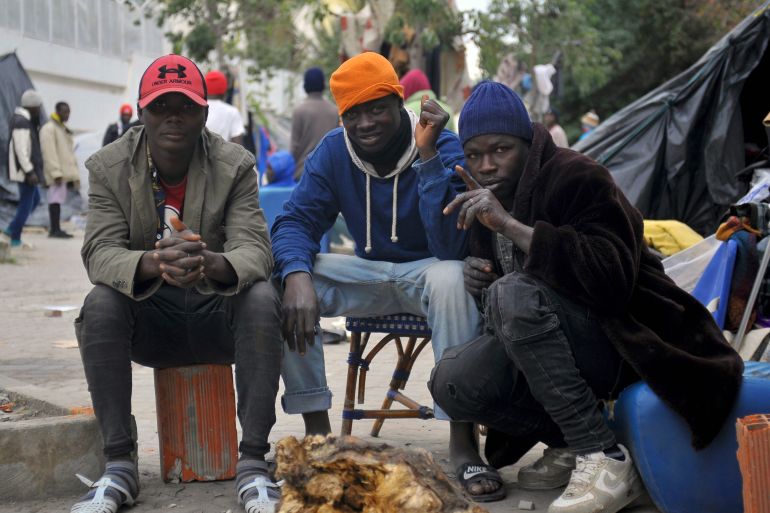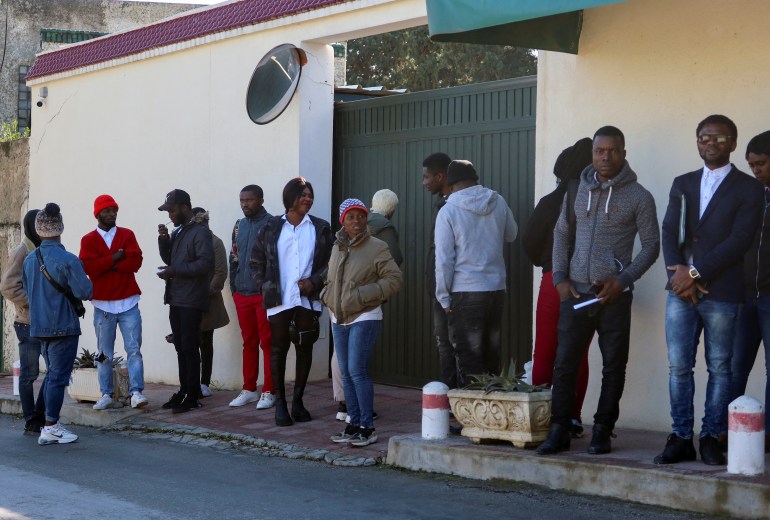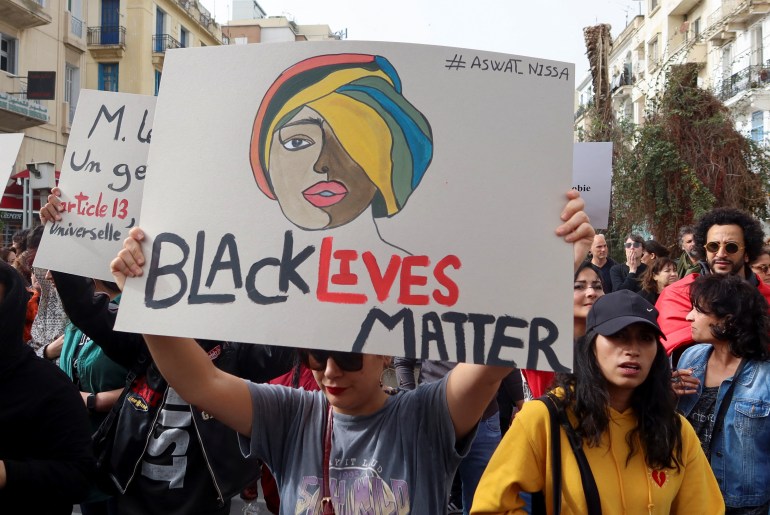Sub-Saharan Africans recount Tunisia ‘hell’ amid crackdown
Racial tensions are spinning out of control as many sub-Saharan Africans prepare to leave the country.

African countries have launched repatriation schemes after Tunisia’s President Kais Saied launched a crackdown against undocumented sub-Saharan nationals, whom he accused of crimes and plotting to change the country’s demographic makeup.
The Ivory Coast was preparing to fly nearly 300 citizens out of Tunisia on Saturday, the ambassador in Tunis told AFP, as dozens of nationals gathered outside the embassy in Tunis.
Keep reading
list of 3 itemsAfrican Union condemns Tunisia’s ‘hate speech’ against migrants
What you need to know about Tunisia’s anti-racism protests
Mali’s embassy said it expected to fly home about 150 people on the same day. The Guinean military government was the first to bring back some 50 nationals on Wednesday evening.
Alseny Barry, a Guinean citizen repatriated from Tunisia, told Al Jazeera that conditions had been “very difficult”.
“We live in hell,” he said. “When we go out they catch us and they put us in jail. They have prepared a special prison for sub-Saharan Africans, when they catch you they send you there.”
Tunisia’s President Saied last month ordered security forces to take “urgent measures” against “hordes” of sub-Saharan African undocumented immigrants, accusing them without evidence of causing a wave of crime and plotting a demographic change.
Many of the estimated 21,000 sub-Saharan African people in Tunisia – most of whom are undocumented – lost their jobs and housing overnight.

Racialised hate speech’
The African Union (AU) criticised Tunisia and urged it to avoid “racialised hate speech”. Saied has denied that his views were racist.
Ahmed Benchemsi, advocacy director for the Middle East and North Africa at Human Rights Watch (HRW), said Saied’s speech had a “very nefarious impact.”
“We have recorded exacerbated peaks of violence against sub-Saharan Africans,” he told Al Jazeera. “The authorities have been arresting sub-Saharan Africans indiscriminately without even checking their legal status, so the theory that they are only after undocumented migrants is not true.”
At least 40 students have been detained so far, according to HRW.
“There are many cases of disappearances across the country, and this is very worrying, we don’t know where they are,” Benchemsi said.

He added that the police crackdown came amid reports of increased violent attacks perpetrated by citizens, who taunt their victims with racial slurs.
Africa Students Assistance, an organisation providing services to Sub-Saharan African students in Tunisia and Morocco, said in a statement on social media that Saied’s speech had only intended to denounce clandestine migration.
“There are therefore no difficulties for students with a regular status,” it said.
‘A wave of hatred without reason’
Ibrahima Barry, who travelled to Tunisia for university in 2019, said neighbours broke into his home in the city of Gabes and ordered him not to move.
He said his landlord saved him, forcing the intruders to leave and then driving him the 400 kilometres (250 miles) to the Guinean consulate in Tunis.
“In my neighbourhood, black people were sought out, chased, raped, and their homes looted by Tunisians”, he said, adding they were sometimes assisted by police.
Twenty-six-year-old Ibrahima Barry described the recent events as “a wave of hatred without reason.”
“In Tunisia, if I tell you that they are savages, it is not too strong a word,” he told AFP.
Hundreds of Tunisians have taken to the streets to denounce racism against refugees and express solidarity with undocumented immigrants.
Tunisian and foreign volunteers brought donations of food, water and blankets, along with some tents to help those displaced.
“We prefer to keep it low-key,” Seif Ghrairi, an activist from the country’s Anti-Fascist Front – hastily formed in the days after Saied’s speech – told AFP.
“Even associations collecting donations [for migrants] are receiving threats.”